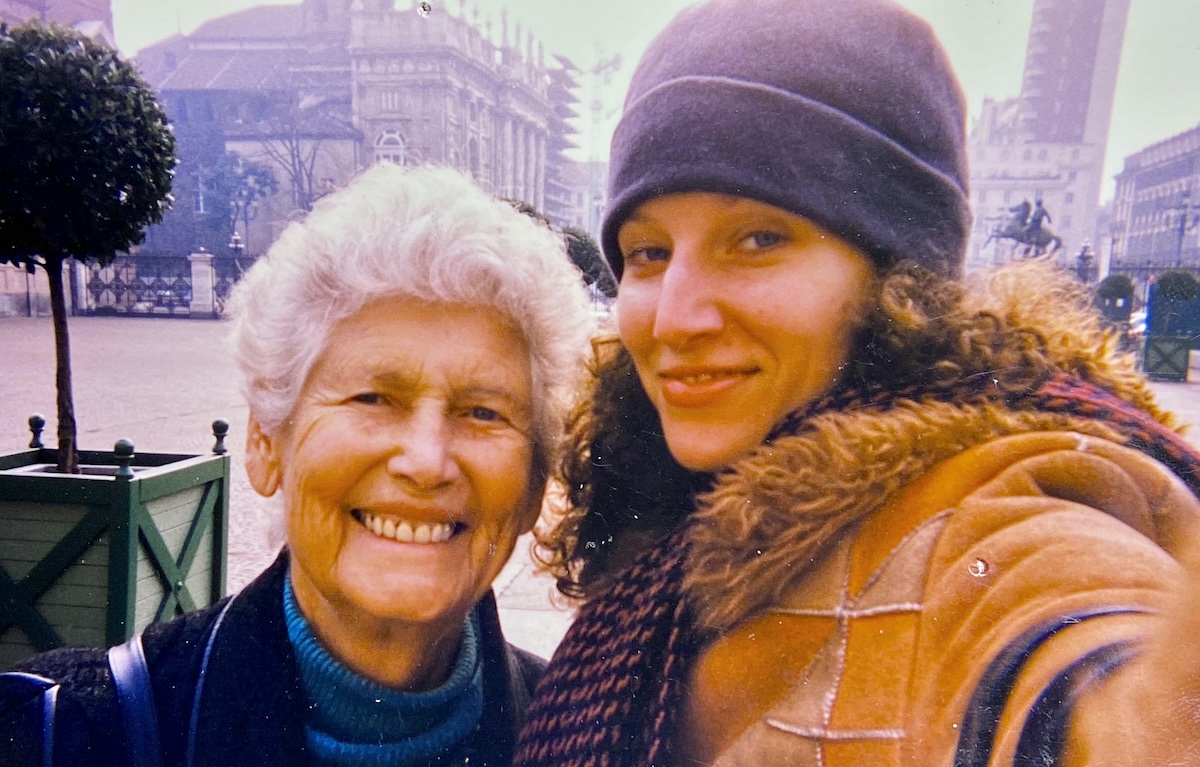In recognition of Jewish American Heritage Month, we are pleased to spotlight the compelling work of UGFTV faculty member Enid Zentelis. Her acclaimed podcast “How My Grandmother Won WWII” uncovers her Hungarian-Jewish grandmother’s covert wartime efforts, and her earlier film Granny was an Outlaw chronicles her family’s Holocaust rescue by Raoul Wallenberg.
Professor Zentelis is an award-winning director, writer, and podcaster whose previous films include Evergreen, which played in Dramatic Competition at the Sundance Film Festival, and Bottled Up, which screened at the Tribeca Film Festival. Zentelis recently published her feature screenplay Everybody Gets Killed as part of the inaugural series from Screen(Play) Press’ “Best Un-produced Screenplays.”
Your podcast was partially born out of the sociopolitical climate that has characterized the past decade. A few years removed from the release of “How My Grandmother Won World War II,” how do you feel this heightened relevance continues to shape its impact?
Thank you for the opportunity to speak about my grandmother. She would want to start off by commenting about being profiled or celebrated amongst other Jewish people, that she is many things, we all are. Celebrating one particular aspect of your identity is valuable only if it helps everyone see the common humanity in each other. My grandmother loved her family, but never centered herself or her background as a Hungarian-Jewish Holocaust survivor. The value of sharing one’s personal history is in how it can be useful in furtherance of helping others everywhere, and in dispelling myths of monolithism. My grandmother boldly and courageously believed in the best of humankind during the time of the Holocaust that killed her husband, father, and almost her children and herself. The story, “How My Grandmother Won WWII,” is an invitation to love each other and fight fascism, most especially right now with unspeakable cruelty on the rise.
This work was of course a deeply personal undertaking for you. In the pilot episode, when describing your grandmother’s heroics, you say proudly, “We fought back, long before we were survivors.” How has this work ultimately helped you process your family’s legacy?
We tend to latch onto a family narrative which ends up having outsized influence on how we move in this world. Family narratives and family lore can be powerful and inspiring, but they can also be limiting and stifling. Discovering a different family history, in my grandmother’s story, opened up my understanding of my family’s past, and therefore created new colors in my current worldview. It afforded me the rarest opportunity to reenvision my life, my mom and my grandmother’s life, all of it anew. I don’t accept simplified, reductive narratives. I don’t accept what others tell me I should or should not be based on the past.
There is a courage required of a storyteller embarking upon a new medium. Did this project furnish any specific learnings that you carry with you in your filmmaking or your approach to teaching?
Podcasting required that I use my voice. This is a frightening and powerful aspect to the medium. An image-maker all of my life, I felt exposed in a new way telling this story, and that exposure and vulnerability in the end gave me new confidence as an artist and storyteller.
I was also able to share with my students how valuable iterative storytelling is across mediums. It is not just an opportunity to cultivate an audience, iterative storytelling is a real opportunity to find your voice.
Are there any developments to report on regarding an adaptation for a scripted series? What else are you working on at the moment?
I am looking forward to directing my next narrative feature, French Connections, that I also wrote and set in Corsica.
The WGAE strike caused the company that owned the TV series based on “How My Grandmother Won WWII” to fold. It was a very hard moment. But I am also very excited about my current book proposal for an expanded version of this story being sold by Janklow & Nesbit. My grandmother’s conversation with the world lives on. Her story and voices of women all over the world are sorely needed now more than ever.
From Enid Zentelis’ forthcoming book How My Grandmother Won WWII:
Excerpt 1: “When I was a kid I thought, is that what’s going to happen to me?! The scars, the wrinkles, the pendulous breasts… My grandmother and I swam daily together in Corsica where she settled after surviving the Holocaust, and for the most part, lived as a nudist. As a small child, I never gave my own nakedness a thought; as a teenager, I wore shorts and shirts over my swimsuits. As an adult, I shed my clothes again to swim, and I grew to see her body as a blueprint for survival; a map of the female experience. But like so many aspects of my grandmother which I thought I knew intimately, I now recognize her body too held secrets that I would only come to understand long after it returned to the earth.”
Excerpt 2: “I knew those boxes also contained a lot of my grandmother’s memorabilia and I missed her so much. I was in a restless state of mind - full of longing for the way she had made me feel in her presence, emboldened, free - as I opened a recent package from my mom. After rummaging through rescued photos, drawings and old books, I found myself staring at a letter, a war commendation I had seen in childhood, but never fully understood. It was from the Allied Control Commission addressed to my grandmother, thanking her for her highly confidential work.”
